【聚焦中考】2015年中考英语(甘肃)课件(考点梳理+高效自测+常见考点+讲透练活)第14讲 八年级下Units+9-10(共29张PPT)
文档属性
| 名称 | 【聚焦中考】2015年中考英语(甘肃)课件(考点梳理+高效自测+常见考点+讲透练活)第14讲 八年级下Units+9-10(共29张PPT) | 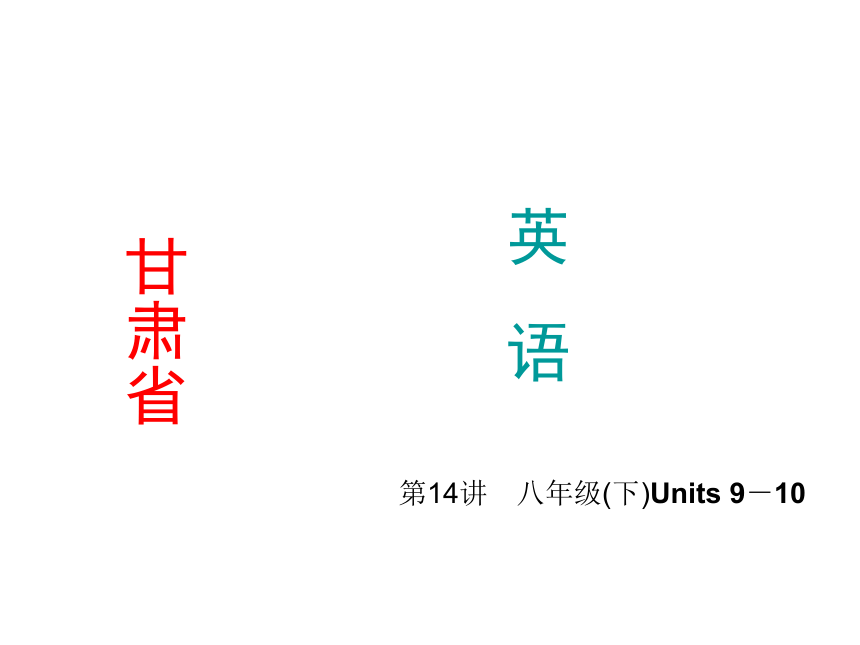 | |
| 格式 | zip | ||
| 文件大小 | 665.4KB | ||
| 资源类型 | 教案 | ||
| 版本资源 | 通用版 | ||
| 科目 | 英语 | ||
| 更新时间 | 2014-12-20 14:33:45 | ||
图片预览

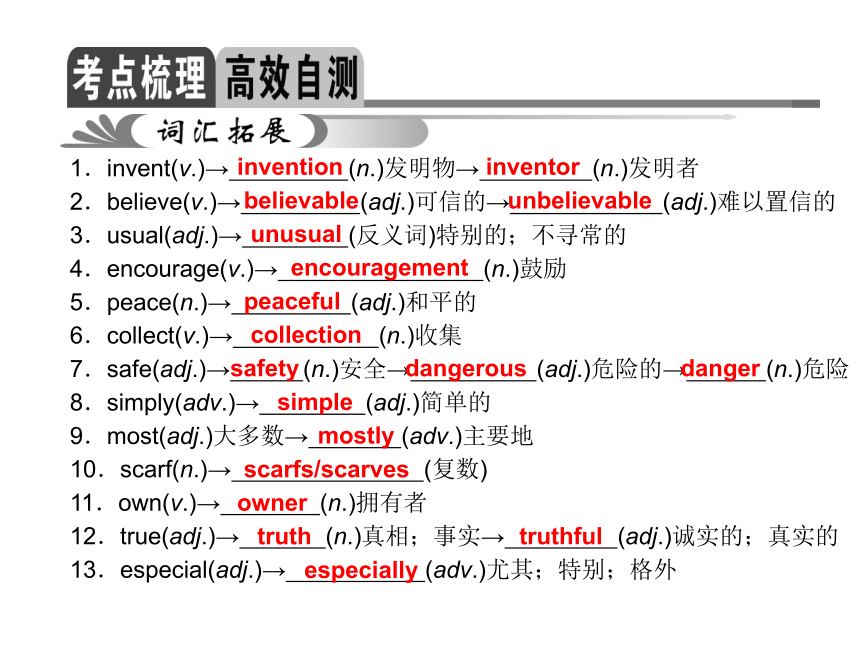
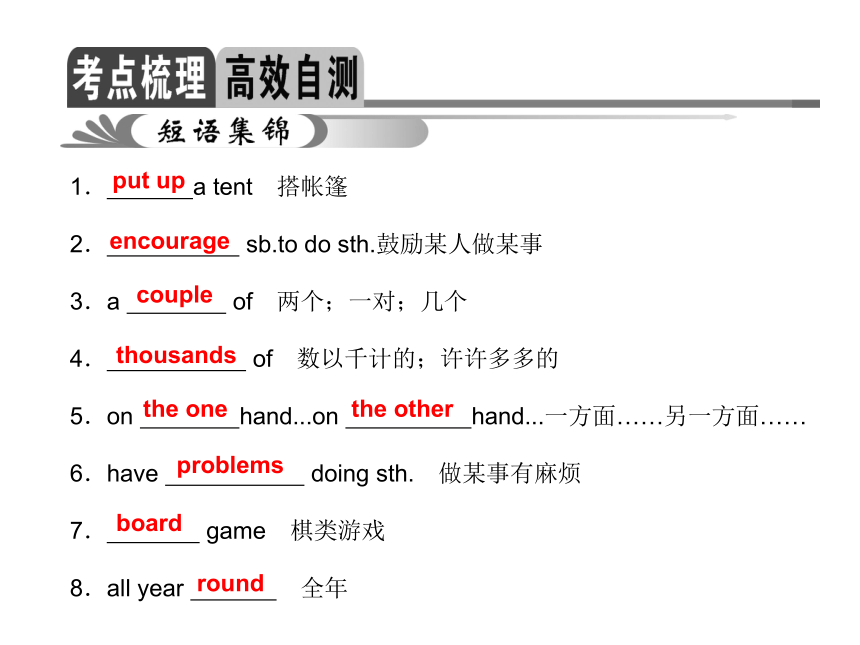
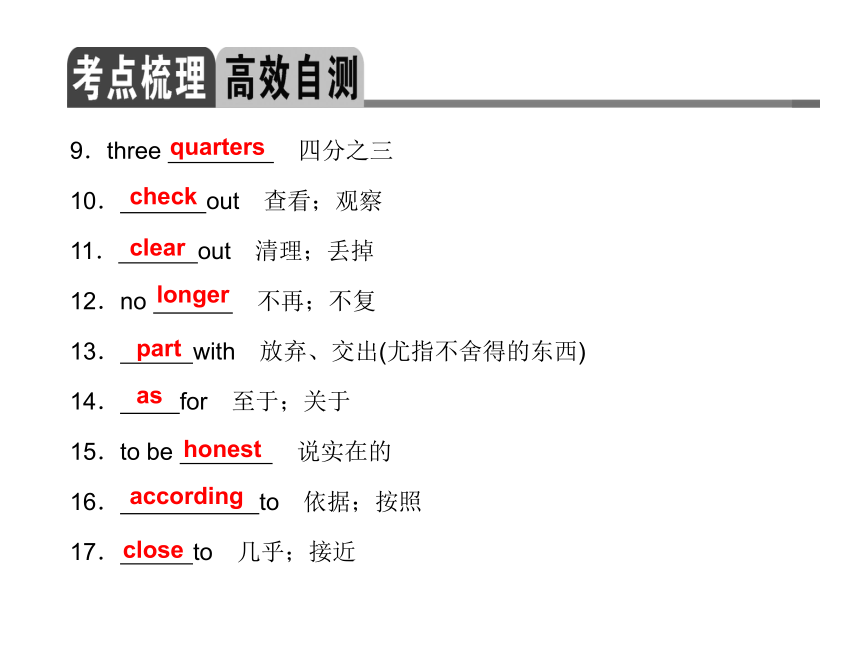
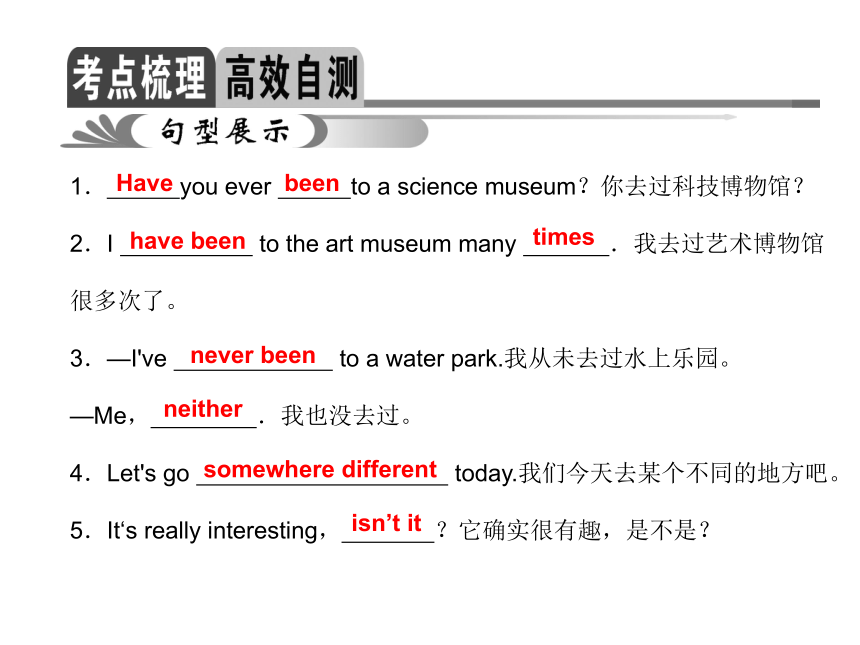
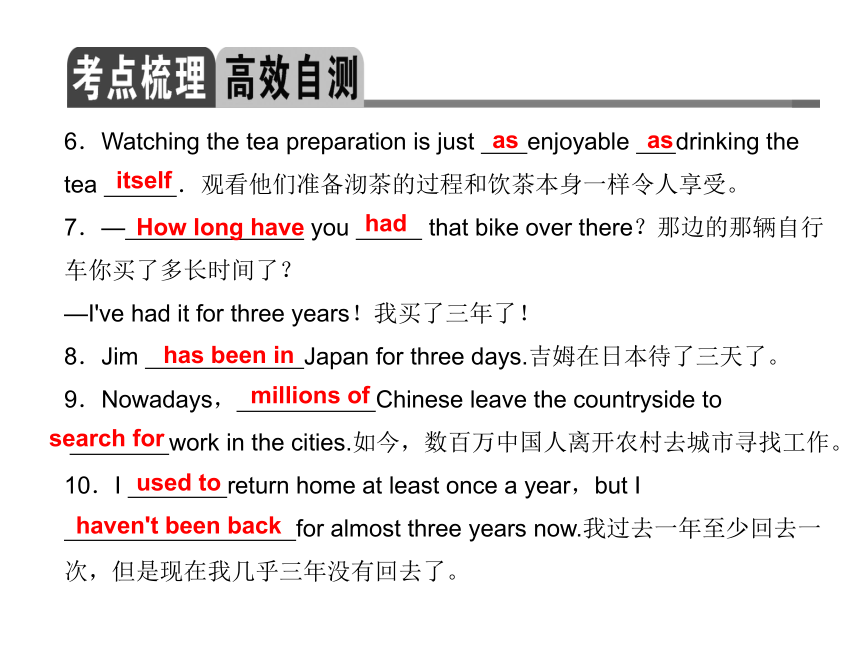
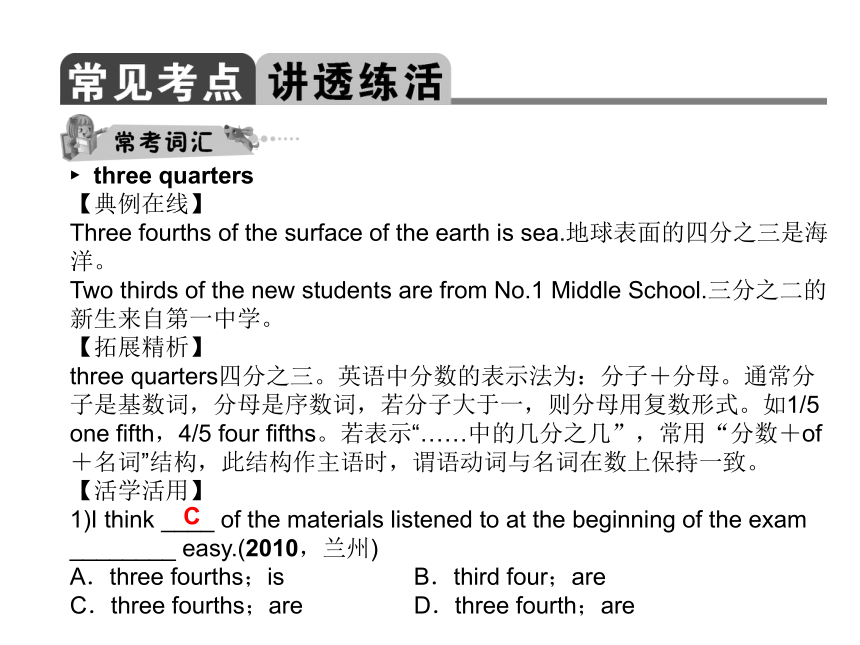
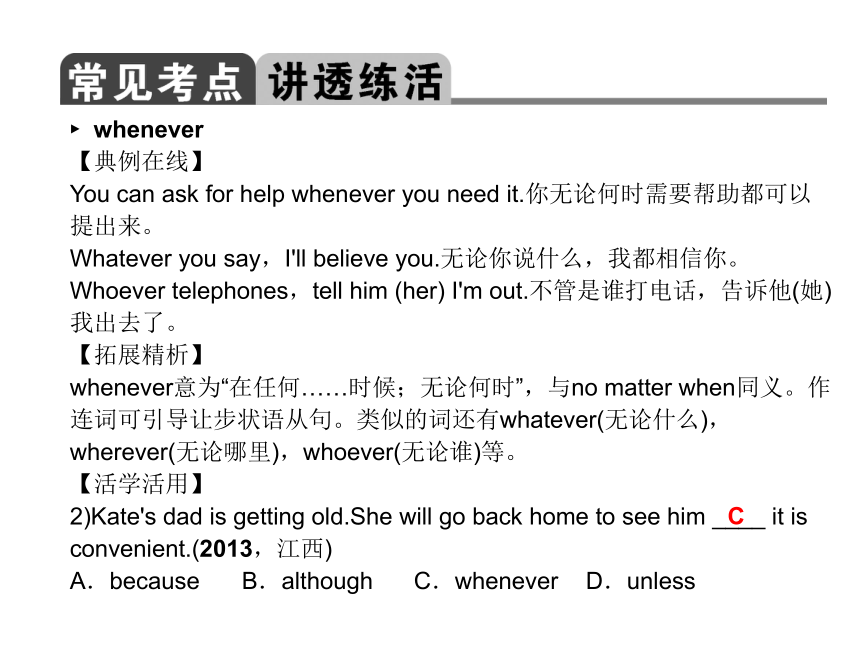
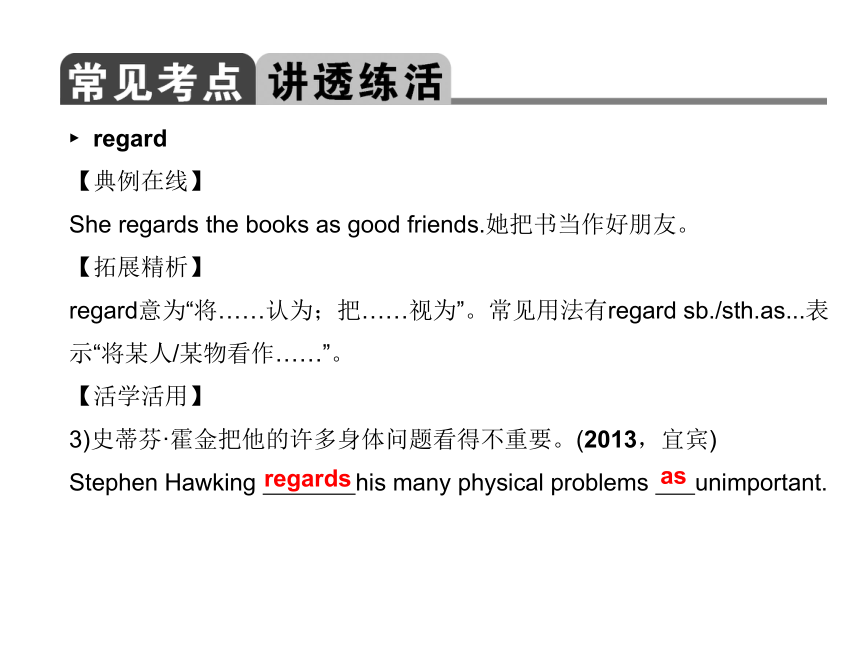
文档简介
课件29张PPT。甘肃省英
语第14讲 八年级(下)Units 9-101.invent(v.)→ (n.)发明物→ (n.)发明者
2.believe(v.)→ (adj.)可信的→ (adj.)难以置信的
3.usual(adj.)→ (反义词)特别的;不寻常的
4.encourage(v.)→ (n.)鼓励
5.peace(n.)→ (adj.)和平的
6.collect(v.)→ (n.)收集
7.safe(adj.)→ (n.)安全→ (adj.)危险的→ (n.)危险
8.simply(adv.)→ (adj.)简单的
9.most(adj.)大多数→ (adv.)主要地
10.scarf(n.)→ (复数)
11.own(v.)→ (n.)拥有者
12.true(adj.)→ (n.)真相;事实→ (adj.)诚实的;真实的
13.especial(adj.)→ (adv.)尤其;特别;格外inventioninventorbelievableunbelievableunusualencouragementpeacefulcollectionsafetydangerousdangersimplemostlyscarfs/scarvesownertruthtruthfulespecially1. a tent 搭帐篷
2. sb.to do sth.鼓励某人做某事
3.a of 两个;一对;几个
4. of 数以千计的;许许多多的
5.on hand...on hand...一方面……另一方面……
6.have doing sth. 做某事有麻烦
7. game 棋类游戏
8.all year 全年put upencouragecouplethousandsthe oneproblemsboardroundthe other9.three 四分之三
10. out 查看;观察
11. out 清理;丢掉
12.no 不再;不复
13. with 放弃、交出(尤指不舍得的东西)
14. for 至于;关于
15.to be 说实在的
16. to 依据;按照
17. to 几乎;接近quarterscheckclearlongerparthonestaccordingcloseas1. you ever to a science museum?你去过科技博物馆?
2.I to the art museum many .我去过艺术博物馆很多次了。
3.—I've to a water park.我从未去过水上乐园。
—Me, .我也没去过。
4.Let's go today.我们今天去某个不同的地方吧。
5.It‘s really interesting, ?它确实很有趣,是不是?Havebeenhave beennever beenneithersomewhere differentisn’t ittimes6.Watching the tea preparation is just enjoyable drinking the tea .观看他们准备沏茶的过程和饮茶本身一样令人享受。
7.— you that bike over there?那边的那辆自行车你买了多长时间了?
—I've had it for three years!我买了三年了!
8.Jim Japan for three days.吉姆在日本待了三天了。
9.Nowadays, Chinese leave the countryside to
work in the cities.如今,数百万中国人离开农村去城市寻找工作。
10.I return home at least once a year,but I
for almost three years now.我过去一年至少回去一次,但是现在我几乎三年没有回去了。asasitselfhadhas been inmillions ofsearch forused toHow long havehaven't been back?three quarters
【典例在线】
Three fourths of the surface of the earth is sea.地球表面的四分之三是海洋。
Two thirds of the new students are from No.1 Middle School.三分之二的新生来自第一中学。
【拓展精析】
three quarters四分之三。英语中分数的表示法为:分子+分母。通常分子是基数词,分母是序数词,若分子大于一,则分母用复数形式。如1/5 one fifth,4/5 four fifths。若表示“……中的几分之几”,常用“分数+of+名词”结构,此结构作主语时,谓语动词与名词在数上保持一致。
【活学活用】
1)I think ____ of the materials listened to at the beginning of the exam ________ easy.(2010,兰州)
A.three fourths;is B.third four;are
C.three fourths;are D.three fourth;areC?whenever
【典例在线】
You can ask for help whenever you need it.你无论何时需要帮助都可以提出来。
Whatever you say,I'll believe you.无论你说什么,我都相信你。
Whoever telephones,tell him (her) I'm out.不管是谁打电话,告诉他(她)我出去了。
【拓展精析】
whenever意为“在任何……时候;无论何时”,与no matter when同义。作连词可引导让步状语从句。类似的词还有whatever(无论什么),wherever(无论哪里),whoever(无论谁)等。
【活学活用】
2)Kate's dad is getting old.She will go back home to see him ____ it is convenient.(2013,江西)
A.because B.although C.whenever D.unlessC?regard
【典例在线】
She regards the books as good friends.她把书当作好朋友。
【拓展精析】
regard意为“将……认为;把……视为”。常见用法有regard sb./sth.as...表示“将某人/某物看作……”。
【活学活用】
3)史蒂芬·霍金把他的许多身体问题看得不重要。(2013,宜宾)
Stephen Hawking his many physical problems unimportant.regardsas?especially
【典例在线】
Flowers are always welcomed,especially in winter.鲜花总是受到欢迎,尤其是在冬天。
【拓展精析】
especially副词,意为“尤其;特别;格外”,在句中常用作状语,用于列举某个特例或某事物的特殊性。其形容词形式为especial,意为“特别的;特殊的”。
【活学活用】
4)The city of Harbin is beautiful all the year around, (尤其) in winter.Ice lanterns decorate streets and attract plenty of tourists.especially?—I've never been to a water park.我从来没有去过水上公园。
—Me neither.我也没去过。
【典例在线】
—She doesn't like playing basketball.她不喜欢打篮球。
—Me neither.我也不喜欢。
—He can speak English.他会讲英语。
—Me,too.我也会。
【拓展精析】
Me neither意为“我也不”。表示前一句所述的否定情况也适用于后者时,可用此简略形式。
Me,too意为“我也一样”。表示前一句所述的肯定情况也适用于后者时,可用此简略形式。
【活学活用】
1)—He didn't finish his homework yesterday.
— .(我也没有。)Me neither?Among these is Zhong Wei,a 46-year-old husband and father.钟伟,一位46岁的丈夫和父亲,就是其中的一位。
【典例在线】
Tom is a 10-year-old boy.
=Tom is a boy of 10 years old.汤姆是一个10岁的男孩。
【拓展精析】
46-year-old是一个复合形容词,在句中作定语。这种复合形容词有两个特点:一是数词、名词、形容词之间要用连字符连接,二是数词后的名词用单数形式。
另一种类似的复合形容词作定语的结构是:数词+连字符“-”+名词(单数)。【活学活用】
2)—How far is it from Tianjin to Changsha?
—It is a ____ flight from Tianjin to Changsha.
A.2-hour-long B.2-hours-long
C.2 hours' long D.2 hour long
3)The park is far away from here indeed.It's about ____ walk.(2014,苏州)
A.a three hour B.a three hour's
C.a three-hours D.a three-hourAD?I have had this bike for three years.这辆自行车我已经买了三年了。
【典例在线】
She has worked here for five years.她在这儿工作五年了。
He has been in the army for two years.他参军已经两年了。
【拓展精析】
在现在完成时中,与表示一段时间的时间状语连用时,谓语动词通常用延续性动词。如:learn,be,work,know,keep,have等。
【活学活用】
4)—What a nice bike!How long ____ you it?
—Just for five weeks.
A.will;buy B.did;buy
C.are;having D.have;had
5)—The storybook is very interesting.
—I agree with you.I ____ it twice already.
A.read B.will read C.am reading D.have readDD?have/has been to,have/has gone to,have/has been in
【典例在线】
I have never been to a water park.我从来都没有去过水上公园。
—Where's Kathy?凯西在哪里?
—She's gone to Shanghai.她去上海了。
He has been in Beijing for ten years.他在北京10年了。
【拓展精析】
have been to“曾经去过,人已经回来了”,常与ever或never连用,也可与表示次数的词连用,表示“去过(某地)几次”。
have gone to“去了”,在去某地的路上或已经在某地,人还未回来,只能用于第三人称。
have been in“已经在(某地)”,常与一段时间连用。
【活学活用】
1)—Where is Mr.Wang?
—He together with his students ____ Zhuyuwan Park.(2014,扬州)
A.has gone to B.have gone to
C.has been to D.have been toA?since,for?
【典例在线】
My aunt has worked in a bank since 1992.自从1992年我姑姑就在一家银行工作。
I have been in Beijing since I left home.自从离开家我就在北京了。
We've known each other for more than two years.我们认识两年多了。
【拓展精析】
现在完成时常和since及for引导的时间状语连用。
since之后常接①过去一个时间点(如具体的年、月、日、钟点);②一段时间+ago;③从句(从句多用一般过去时)来说明动作起始时间。
for之后常接时间段,说明某种情况已经持续了一段时间。句中的谓语动词应用延续性动词。
现在完成时中,对一段时间提问,常用how long。【活学活用】
2)—How long have you lived in the new flat?
—____ 2012.(2013,扬州)
A.In B.After C.Since D.Before
3)I'm looking after Tom today.He's been in my house ____ 8:00 this morning.(2013,十堰)
A.at B.for C.since D.tillCC?do with,deal with
【典例在线】
I don't know how they deal with the problem.=I don't know what they do with the problem.我不知道他们是如何处理这个问题的。
【拓展精析】
两者都表示“处理”。但do with常和疑问词what连用;deal with常和疑问词how连用。
【活学活用】
4)—Many students don't know how to ____ stress and become worried.
—I think they'd better ask their teachers for help.
A.argue with B.deal with
C.quarrel with D.come up withB一、根据句意及首字母或汉语提示完成单词。
1.You'll be (安全的) here.
2.Air pollution is one of the most serious (社会的) problems there.
3.Jack is an (诚实的) boy,so we all like him very much.
4.To my (羞愧) I never thanked him for his kindness.
5.That song always brings back lots of good (回忆).
6.We need three (围巾) for the girls.
7.No one is .Everybody makes mistakes sometimes.
8.In leaves begin to grow on the trees.
9.Look!There is a house the trees.
10.We all our English teacher as our best friend.safesocialhonestshamememoriesscarves/scarfsperfectspringamongregard二、用括号内所给动词的适当形式填空。(2014,泰州)
11.Our teachers often tell us (calm) down first when we are in danger.
12.There (be) an English Summer Camp next month.Come and join us.
13.China (send) up several shenzhou manned spacecraft into space since 2003.
14.The TV program Super Brain (最强大脑) is so fantastic that it is well worth (watch).
15.They are looking forward to (win) the first prize in the coming competition.to calmwill behas sentwatchingwinning三、单项选择。
16.—Mum,____ of the apples ________ gone bad.
—We'd better eat up the rest as soon as possible.(2014,内江)
A.one third;have B.one thirds;have
C.one third;has D.first three;has
17.Peter has never been to a water park.____.
A.I haven't neither B.I haven't too
C.Me,too D.Me neither
18.—____ have you been in the sports club?
—Since the first month I came to the school.(2013,上海)
A.How old B.How long C.How much D.How soonADB19.—Are Betty and Lingling still living in Beijing?
—No,they ____ to Qingdao.(2014,潍坊)
A.will move B.are moved
C.have moved D.move
20.She ____ her hometown since she was 18 years old.She told me she would return soon.(2014,凉山)
A.has left B.has been away from
C.left D.went awayCB四、根据汉语意思完成下列句子。
21.说实话,我不想和他们一起去看电影。
To ,I wouldn't like to go to the movies with them.
22.至于我,还没去过那个城市。
me,I haven't been to that city.
23.根据预报明天将有雪。
the broadcast there will be snow tomorrow.
24.他准时到达这里是没有任何问题的。
He won't here on time.
25.几天之后,他离开了北京。
After days,he left Beijing.be honestAs forAccording tohave any problem arrivinga couple of写作典例之旅游与安全
(一)(2011,温州)
初中的生活即将结束,一项调查结果显示很多同学想在考试后去旅游,但是也有同学不喜欢旅游。请以“Traveling Is... ”为题写一篇100词左右的短文谈谈你的看法。
要求:1.先把题目补充完整(可用interesting,boring等);
2.文中不得出现真实的人名、校名等相关信息。【范文欣赏一】
Traveling Is Interesting
Traveling is interesting.
You will have lots of fun things to do and see during the trip.Just imagine that you are walking in the beautiful mountains,enjoying the fresh air and listening to the bird's singing.It's amazing,isn't it? Sometimes,you may meet people from different places and make friends with them,which makes your trip a more pleasant one.Also,you may have many interesting things to share with your friends when you are back.All the pleasure of your trip will be kept in your memory.
It's not surprising that so many students can't wait to go traveling after the examination!【范文欣赏二】
Traveling Is Boring
Traveling is usually boring.
There are always too many people in places of interest in China and it is crowded everywhere,especially on holidays.Just imagine that you are waiting in line,hungry and thirsty.“Why do I come here? To see the crowd?” you may complain.If you are unlucky,you may meet a bad guide who pushes you to shop here and there.It's terrible,isn't it? Also,you may have to get up early to take the plane or wait in the airport for hours because of the delayed flight.
Therefore,I prefer to stay at home than go traveling after the examination.(二)(2014,安徽)
假定你是王伟,你的英国笔友戴维(David)来信问及你们学校在暑假期间对学生的要求。请你根据以下要点给他回一封电子邮件。
●家庭安全:小心用火用电,外出时关好门窗;
●游泳安全:不独自去游泳,不去河、湖游泳;
●交通安全: 过马路要当心,不在马路上玩耍。
提示词:electricity (n.电)
注意:1.词数80-100;
2.请不要逐句翻译,可适当发挥;
3.文中不能出现真实的校名和人名;
4.邮件的开头和结尾已为你写好,不计入总词数。【范文欣赏】
Dear David,
Glad to receive your e-mail.Our school has made many safety rules for us to follow.Let me tell you something about them.
We are asked to be careful with electricity when we are using it.It is dangerous to play with fire,for it may cause terrible accidents.We should make sure doors and windows are shut before we leave.Besides,we are not allowed to swim alone,especially in deep rivers or lakes.If we really want to,we must go to the swimming pool with our parents or teachers.What's more,following traffic rules is also very important.Everyone should watch out when crossing the road.And our school warns us not to play on the road.
I think these rules are necessary as safety comes first.
Have a good summer holiday!
Yours,
Wang Wei请完成考点跟踪突破14
语第14讲 八年级(下)Units 9-101.invent(v.)→ (n.)发明物→ (n.)发明者
2.believe(v.)→ (adj.)可信的→ (adj.)难以置信的
3.usual(adj.)→ (反义词)特别的;不寻常的
4.encourage(v.)→ (n.)鼓励
5.peace(n.)→ (adj.)和平的
6.collect(v.)→ (n.)收集
7.safe(adj.)→ (n.)安全→ (adj.)危险的→ (n.)危险
8.simply(adv.)→ (adj.)简单的
9.most(adj.)大多数→ (adv.)主要地
10.scarf(n.)→ (复数)
11.own(v.)→ (n.)拥有者
12.true(adj.)→ (n.)真相;事实→ (adj.)诚实的;真实的
13.especial(adj.)→ (adv.)尤其;特别;格外inventioninventorbelievableunbelievableunusualencouragementpeacefulcollectionsafetydangerousdangersimplemostlyscarfs/scarvesownertruthtruthfulespecially1. a tent 搭帐篷
2. sb.to do sth.鼓励某人做某事
3.a of 两个;一对;几个
4. of 数以千计的;许许多多的
5.on hand...on hand...一方面……另一方面……
6.have doing sth. 做某事有麻烦
7. game 棋类游戏
8.all year 全年put upencouragecouplethousandsthe oneproblemsboardroundthe other9.three 四分之三
10. out 查看;观察
11. out 清理;丢掉
12.no 不再;不复
13. with 放弃、交出(尤指不舍得的东西)
14. for 至于;关于
15.to be 说实在的
16. to 依据;按照
17. to 几乎;接近quarterscheckclearlongerparthonestaccordingcloseas1. you ever to a science museum?你去过科技博物馆?
2.I to the art museum many .我去过艺术博物馆很多次了。
3.—I've to a water park.我从未去过水上乐园。
—Me, .我也没去过。
4.Let's go today.我们今天去某个不同的地方吧。
5.It‘s really interesting, ?它确实很有趣,是不是?Havebeenhave beennever beenneithersomewhere differentisn’t ittimes6.Watching the tea preparation is just enjoyable drinking the tea .观看他们准备沏茶的过程和饮茶本身一样令人享受。
7.— you that bike over there?那边的那辆自行车你买了多长时间了?
—I've had it for three years!我买了三年了!
8.Jim Japan for three days.吉姆在日本待了三天了。
9.Nowadays, Chinese leave the countryside to
work in the cities.如今,数百万中国人离开农村去城市寻找工作。
10.I return home at least once a year,but I
for almost three years now.我过去一年至少回去一次,但是现在我几乎三年没有回去了。asasitselfhadhas been inmillions ofsearch forused toHow long havehaven't been back?three quarters
【典例在线】
Three fourths of the surface of the earth is sea.地球表面的四分之三是海洋。
Two thirds of the new students are from No.1 Middle School.三分之二的新生来自第一中学。
【拓展精析】
three quarters四分之三。英语中分数的表示法为:分子+分母。通常分子是基数词,分母是序数词,若分子大于一,则分母用复数形式。如1/5 one fifth,4/5 four fifths。若表示“……中的几分之几”,常用“分数+of+名词”结构,此结构作主语时,谓语动词与名词在数上保持一致。
【活学活用】
1)I think ____ of the materials listened to at the beginning of the exam ________ easy.(2010,兰州)
A.three fourths;is B.third four;are
C.three fourths;are D.three fourth;areC?whenever
【典例在线】
You can ask for help whenever you need it.你无论何时需要帮助都可以提出来。
Whatever you say,I'll believe you.无论你说什么,我都相信你。
Whoever telephones,tell him (her) I'm out.不管是谁打电话,告诉他(她)我出去了。
【拓展精析】
whenever意为“在任何……时候;无论何时”,与no matter when同义。作连词可引导让步状语从句。类似的词还有whatever(无论什么),wherever(无论哪里),whoever(无论谁)等。
【活学活用】
2)Kate's dad is getting old.She will go back home to see him ____ it is convenient.(2013,江西)
A.because B.although C.whenever D.unlessC?regard
【典例在线】
She regards the books as good friends.她把书当作好朋友。
【拓展精析】
regard意为“将……认为;把……视为”。常见用法有regard sb./sth.as...表示“将某人/某物看作……”。
【活学活用】
3)史蒂芬·霍金把他的许多身体问题看得不重要。(2013,宜宾)
Stephen Hawking his many physical problems unimportant.regardsas?especially
【典例在线】
Flowers are always welcomed,especially in winter.鲜花总是受到欢迎,尤其是在冬天。
【拓展精析】
especially副词,意为“尤其;特别;格外”,在句中常用作状语,用于列举某个特例或某事物的特殊性。其形容词形式为especial,意为“特别的;特殊的”。
【活学活用】
4)The city of Harbin is beautiful all the year around, (尤其) in winter.Ice lanterns decorate streets and attract plenty of tourists.especially?—I've never been to a water park.我从来没有去过水上公园。
—Me neither.我也没去过。
【典例在线】
—She doesn't like playing basketball.她不喜欢打篮球。
—Me neither.我也不喜欢。
—He can speak English.他会讲英语。
—Me,too.我也会。
【拓展精析】
Me neither意为“我也不”。表示前一句所述的否定情况也适用于后者时,可用此简略形式。
Me,too意为“我也一样”。表示前一句所述的肯定情况也适用于后者时,可用此简略形式。
【活学活用】
1)—He didn't finish his homework yesterday.
— .(我也没有。)Me neither?Among these is Zhong Wei,a 46-year-old husband and father.钟伟,一位46岁的丈夫和父亲,就是其中的一位。
【典例在线】
Tom is a 10-year-old boy.
=Tom is a boy of 10 years old.汤姆是一个10岁的男孩。
【拓展精析】
46-year-old是一个复合形容词,在句中作定语。这种复合形容词有两个特点:一是数词、名词、形容词之间要用连字符连接,二是数词后的名词用单数形式。
另一种类似的复合形容词作定语的结构是:数词+连字符“-”+名词(单数)。【活学活用】
2)—How far is it from Tianjin to Changsha?
—It is a ____ flight from Tianjin to Changsha.
A.2-hour-long B.2-hours-long
C.2 hours' long D.2 hour long
3)The park is far away from here indeed.It's about ____ walk.(2014,苏州)
A.a three hour B.a three hour's
C.a three-hours D.a three-hourAD?I have had this bike for three years.这辆自行车我已经买了三年了。
【典例在线】
She has worked here for five years.她在这儿工作五年了。
He has been in the army for two years.他参军已经两年了。
【拓展精析】
在现在完成时中,与表示一段时间的时间状语连用时,谓语动词通常用延续性动词。如:learn,be,work,know,keep,have等。
【活学活用】
4)—What a nice bike!How long ____ you it?
—Just for five weeks.
A.will;buy B.did;buy
C.are;having D.have;had
5)—The storybook is very interesting.
—I agree with you.I ____ it twice already.
A.read B.will read C.am reading D.have readDD?have/has been to,have/has gone to,have/has been in
【典例在线】
I have never been to a water park.我从来都没有去过水上公园。
—Where's Kathy?凯西在哪里?
—She's gone to Shanghai.她去上海了。
He has been in Beijing for ten years.他在北京10年了。
【拓展精析】
have been to“曾经去过,人已经回来了”,常与ever或never连用,也可与表示次数的词连用,表示“去过(某地)几次”。
have gone to“去了”,在去某地的路上或已经在某地,人还未回来,只能用于第三人称。
have been in“已经在(某地)”,常与一段时间连用。
【活学活用】
1)—Where is Mr.Wang?
—He together with his students ____ Zhuyuwan Park.(2014,扬州)
A.has gone to B.have gone to
C.has been to D.have been toA?since,for?
【典例在线】
My aunt has worked in a bank since 1992.自从1992年我姑姑就在一家银行工作。
I have been in Beijing since I left home.自从离开家我就在北京了。
We've known each other for more than two years.我们认识两年多了。
【拓展精析】
现在完成时常和since及for引导的时间状语连用。
since之后常接①过去一个时间点(如具体的年、月、日、钟点);②一段时间+ago;③从句(从句多用一般过去时)来说明动作起始时间。
for之后常接时间段,说明某种情况已经持续了一段时间。句中的谓语动词应用延续性动词。
现在完成时中,对一段时间提问,常用how long。【活学活用】
2)—How long have you lived in the new flat?
—____ 2012.(2013,扬州)
A.In B.After C.Since D.Before
3)I'm looking after Tom today.He's been in my house ____ 8:00 this morning.(2013,十堰)
A.at B.for C.since D.tillCC?do with,deal with
【典例在线】
I don't know how they deal with the problem.=I don't know what they do with the problem.我不知道他们是如何处理这个问题的。
【拓展精析】
两者都表示“处理”。但do with常和疑问词what连用;deal with常和疑问词how连用。
【活学活用】
4)—Many students don't know how to ____ stress and become worried.
—I think they'd better ask their teachers for help.
A.argue with B.deal with
C.quarrel with D.come up withB一、根据句意及首字母或汉语提示完成单词。
1.You'll be (安全的) here.
2.Air pollution is one of the most serious (社会的) problems there.
3.Jack is an (诚实的) boy,so we all like him very much.
4.To my (羞愧) I never thanked him for his kindness.
5.That song always brings back lots of good (回忆).
6.We need three (围巾) for the girls.
7.No one is .Everybody makes mistakes sometimes.
8.In leaves begin to grow on the trees.
9.Look!There is a house the trees.
10.We all our English teacher as our best friend.safesocialhonestshamememoriesscarves/scarfsperfectspringamongregard二、用括号内所给动词的适当形式填空。(2014,泰州)
11.Our teachers often tell us (calm) down first when we are in danger.
12.There (be) an English Summer Camp next month.Come and join us.
13.China (send) up several shenzhou manned spacecraft into space since 2003.
14.The TV program Super Brain (最强大脑) is so fantastic that it is well worth (watch).
15.They are looking forward to (win) the first prize in the coming competition.to calmwill behas sentwatchingwinning三、单项选择。
16.—Mum,____ of the apples ________ gone bad.
—We'd better eat up the rest as soon as possible.(2014,内江)
A.one third;have B.one thirds;have
C.one third;has D.first three;has
17.Peter has never been to a water park.____.
A.I haven't neither B.I haven't too
C.Me,too D.Me neither
18.—____ have you been in the sports club?
—Since the first month I came to the school.(2013,上海)
A.How old B.How long C.How much D.How soonADB19.—Are Betty and Lingling still living in Beijing?
—No,they ____ to Qingdao.(2014,潍坊)
A.will move B.are moved
C.have moved D.move
20.She ____ her hometown since she was 18 years old.She told me she would return soon.(2014,凉山)
A.has left B.has been away from
C.left D.went awayCB四、根据汉语意思完成下列句子。
21.说实话,我不想和他们一起去看电影。
To ,I wouldn't like to go to the movies with them.
22.至于我,还没去过那个城市。
me,I haven't been to that city.
23.根据预报明天将有雪。
the broadcast there will be snow tomorrow.
24.他准时到达这里是没有任何问题的。
He won't here on time.
25.几天之后,他离开了北京。
After days,he left Beijing.be honestAs forAccording tohave any problem arrivinga couple of写作典例之旅游与安全
(一)(2011,温州)
初中的生活即将结束,一项调查结果显示很多同学想在考试后去旅游,但是也有同学不喜欢旅游。请以“Traveling Is... ”为题写一篇100词左右的短文谈谈你的看法。
要求:1.先把题目补充完整(可用interesting,boring等);
2.文中不得出现真实的人名、校名等相关信息。【范文欣赏一】
Traveling Is Interesting
Traveling is interesting.
You will have lots of fun things to do and see during the trip.Just imagine that you are walking in the beautiful mountains,enjoying the fresh air and listening to the bird's singing.It's amazing,isn't it? Sometimes,you may meet people from different places and make friends with them,which makes your trip a more pleasant one.Also,you may have many interesting things to share with your friends when you are back.All the pleasure of your trip will be kept in your memory.
It's not surprising that so many students can't wait to go traveling after the examination!【范文欣赏二】
Traveling Is Boring
Traveling is usually boring.
There are always too many people in places of interest in China and it is crowded everywhere,especially on holidays.Just imagine that you are waiting in line,hungry and thirsty.“Why do I come here? To see the crowd?” you may complain.If you are unlucky,you may meet a bad guide who pushes you to shop here and there.It's terrible,isn't it? Also,you may have to get up early to take the plane or wait in the airport for hours because of the delayed flight.
Therefore,I prefer to stay at home than go traveling after the examination.(二)(2014,安徽)
假定你是王伟,你的英国笔友戴维(David)来信问及你们学校在暑假期间对学生的要求。请你根据以下要点给他回一封电子邮件。
●家庭安全:小心用火用电,外出时关好门窗;
●游泳安全:不独自去游泳,不去河、湖游泳;
●交通安全: 过马路要当心,不在马路上玩耍。
提示词:electricity (n.电)
注意:1.词数80-100;
2.请不要逐句翻译,可适当发挥;
3.文中不能出现真实的校名和人名;
4.邮件的开头和结尾已为你写好,不计入总词数。【范文欣赏】
Dear David,
Glad to receive your e-mail.Our school has made many safety rules for us to follow.Let me tell you something about them.
We are asked to be careful with electricity when we are using it.It is dangerous to play with fire,for it may cause terrible accidents.We should make sure doors and windows are shut before we leave.Besides,we are not allowed to swim alone,especially in deep rivers or lakes.If we really want to,we must go to the swimming pool with our parents or teachers.What's more,following traffic rules is also very important.Everyone should watch out when crossing the road.And our school warns us not to play on the road.
I think these rules are necessary as safety comes first.
Have a good summer holiday!
Yours,
Wang Wei请完成考点跟踪突破14
